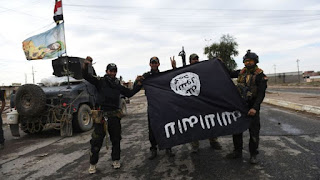Islamic State killing civilians in row about rocket launchers on roofs
Islamic State fighters are killing civilians who refuse to let them put rocket launchers on the roofs of Mosul homes, the UN says.
A United Nations human rights spokeswoman said that the militant group was also murdering people living in the Iraqi city who try to prevent them placing snipers on the roofs of their houses.
Others who have been killed by the group, also known as ISIL, are those suspected of leaking information or trying to flee, Ravina Shamdasani told a regular UN briefing.
She said: "On November 11, ISIL reportedly shot and killed 12 civilians in Bakir neighbourhood of eastern Mosul city for allegedly refusing to let it install rockets on the rooftops of their houses."
Iraqi troops have pushed into the east of the city, but it is expected to take weeks of fighting, if not months, to regain full control.
Brigadier General Haider Fadhil of Iraq's special forces said his men on Monday has now taken 60% of Mosul's Zohour neighbourhood.
Special forces also reached the Masarif district in the northeast of the city but patrols were repeatedly targeted by sniper fire and mortars.
Iraqi commanders say IS resistance in Mosul has been fiercer than anything they have seen previously in the fight against the militants.
The group has launched hundreds of attacks on troops using improvised car bombs.
Previously, US-led coalition air strikes were often called in to deal with the bombs, but in Mosul's residential areas, the vehicles often appear with little warning and the close proximity of civilians prevents the use of air strikes.
What is thought to be up to a million civilians still living in the city have been told to stay at home.
Iraqi government and Kurdish forces are now enveloping the city from the north, east and south, while a coalition of Iranian-backed Shia groups are trying to close in from the west.
Iraqi prime minister Haider al-Abadi said on Tuesday IS fighters lack the courage to put up long-term resistance in Mosul.
He said: "We have seen the whole organisation collapsing in terms of standing in the face of our own armed forces."
Another branch of the United Nations said earlier that families are struggling to feed themselves in Mosul as the fighting goes on.
Trucks loaded with food and clothes reached liberated areas, prompting residents to fight each other for the scant supplies.
Meanwhile, in Sinjar, Kurdish forces have discovered what are thought to be another two Yazidi mass graves, bringing the total number of mass burial sites so far identified in the area to 29.
Thousands of Yazidis are feared to have been killed by IS in August 2014 when Sinjar was taken by the group.


Comments
Post a Comment